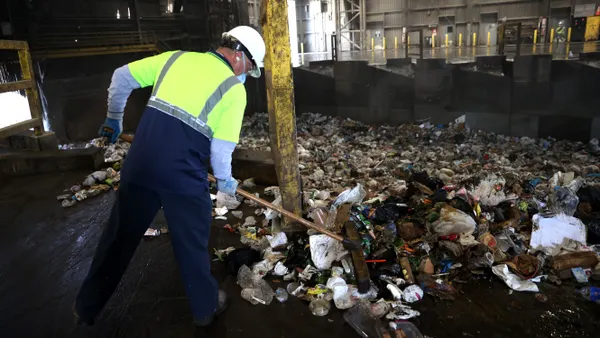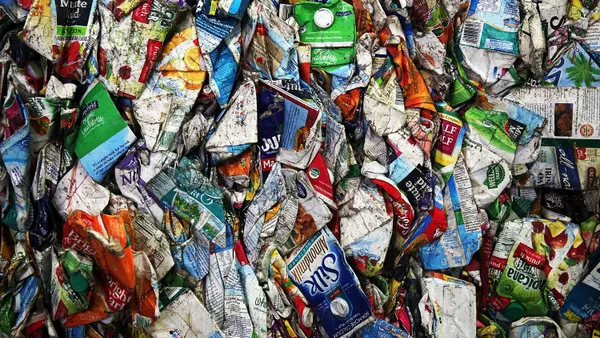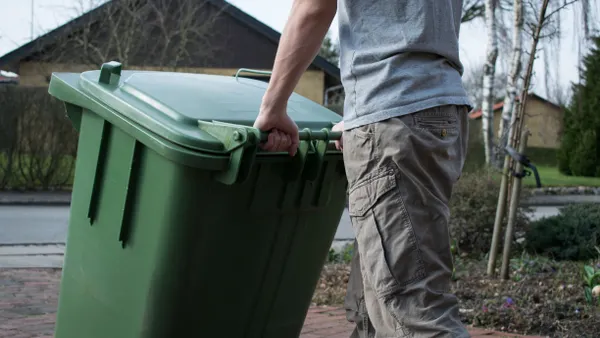Dive Brief:
- Recyclers around the U.S. are starting to change what kinds of materials they are accepting in response to China's changing import policies. In Madison, WI, the city's Streets Division has suspended the collection of rigid plastic, as reported in the Wisconsin State Journal. Recycling facilities around the Portland, OR region are also limiting the types of plastics that they're collecting, as noted by Metro News.
- According to Adina Adler, the senior director of international affairs for the Institute of Scrap and Recycling Industries (ISRI), things are "a bit chaotic" in the U.S. and China. Adler said she knows of importers in China who are canceling orders of recycled scrap from U.S. exporters, and of U.S. exporters who said orders they were expecting never arrived. Some shipments, she said, have sat in Chinese ports because the Chinese customers don't want to deal with any potential liability from claiming the material.
- The changes and "chaos" come from the unclear nature of China's communications with the World Trade Organization (WTO) to ban scrap imports. China's original filing with the WTO said that the ban would enter into force September 2017, but says its "date of adoption" is to be determined. Adler said that ISRI has yet to receive a clear, official answer as to when imports will no longer be allowed.
Dive Insight:
China's import ban disrupting U.S. recycling markets was always a question of "when," never "if." These changes from Madison and Portland are just the beginning, especially considering how massive China's share of the scrap market is. It likely won't be long until other recyclers change what materials they accept — if they haven't already quietly made those changes. According to Solid Waste Association of North America (SWANA) Executive Director David Biderman, SWANA has inquired with members whether other municipalities or companies are starting to make changes, too.
The confusing nature of China's announcements and decisions around the scrap import ban also make it difficult for local government and private operators to know what exactly to do to prepare for the enforcement of the ban. As ISRI President Robin Wiener said when the ban was first filed with the WTO, the full implications of China's new policy could turn out to be "devastating."
"This is going to get bigger," Adler said in an interview with Waste Dive. "China just takes in so much volume. There are other markets, but all of them combined can't get close to what China was taking in."
Recyclers and municipalities around the country already struggle with customer education. Cities looking to hit big diversion numbers are struggling with contamination, too. Not only will it be difficult for companies and governments to explain recycling changes to customers, there's also growing concern that an import ban could impact consumer behavior. As consumers are unable to recycle more materials, or as materials they try to recycle are landfilled or incinerated, they may lose faith and confidence in recycling programs. The logic follows that, if there is a steep decrease in demand for plastic, paper and other scrap material — the kind of decline in demand that would happen if the world's largest purchaser suddenly stopped purchasing — there will be a large oversupply of scrap. With nowhere to send that scrap, it would either have to be stored, incinerated or landfilled.
Recycling in the U.S. is a relatively new phenomenon, and according to The Recycling Partnership, there are millions of metrics tons of recyclables in the U.S. that go uncollected because of lack of access. In order to keep participation in recycling programs high, governments and recyclers will have to be open and transparent with customers about what changes are being made and why — and investing in domestic recycling facilities to beef up capacity wouldn't hurt, either. Otherwise, the depression in recycling participation that the Chinese import ban could have on U.S. consumers may be hard to recover from.










